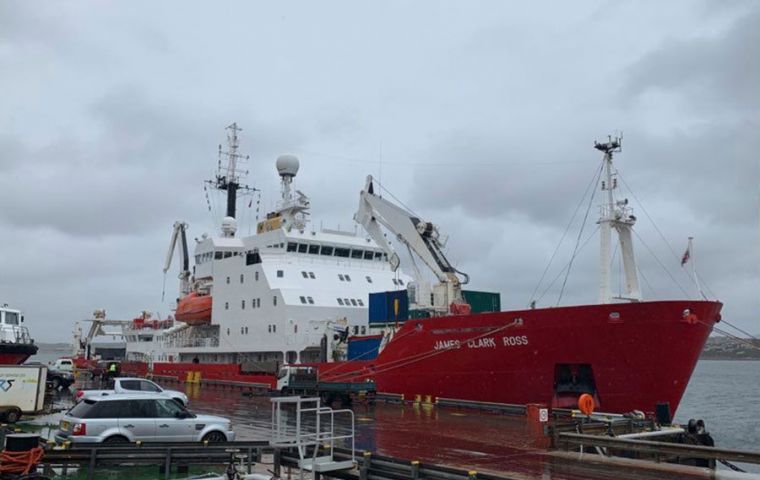MercoPress. South Atlantic News Agency
After thirty years of prolific research, RRS James Clark Ross makes final call to the Falklands
 The JCR departed FIPASS for the final time at 6pm on Monday 1 March and proceeded down Stanley Harbour, before turning and heading out through the Narrows. (Pic by C.Paige)
The JCR departed FIPASS for the final time at 6pm on Monday 1 March and proceeded down Stanley Harbour, before turning and heading out through the Narrows. (Pic by C.Paige) The RRS James Clark Ross (JCR) made her final call to her homeport of the Falkland Islands on Monday March first, since after thirty years of service, the JCR will be sold at the end of her 20/21 Antarctic season.
The Falkland Islands are the final stop on the ship’s five and a half month mission to deliver scientific and operational staff to Antarctica, and to resupply the UK stations in Antarctica for another year. RRS James Clark Ross’ final season has been one like no other, with COVID-19 presenting exceptional operational challenges.
For the past three decades the JCR has been a floating platform for biological, oceanographic and geophysical research. She contains some of Britain’s most advanced facilities for oceanographic research in both Antarctica and the Arctic.
Some of her scientific achievements over the past 30 include:
• During research cruises in 2018 and 2019 on board the RRS James Clark Ross and RRS Discovery, BAS scientists worked with Tristan da Cunha Government and their partners to collect scientific information on their offshore sea mounts. Based on this work, the UK Prime Minister announced the designation of a new Marine Protection Zone By Tristan da Cunha in 2020, safeguarding the future of seven-gill sharks, yellow-nosed albatross and rockhopper penguins.
• Two decades of data collected from the JCR, and Rothera Research Station, revealed the impacts longer growing seasons for algae in the seas of the western Antarctic Peninsula on the removing carbon from the global carbon cycle.
• Data collected on the JCR’s 2016 journey South was used to verify data collected from satellites orbiting the Earth, providing a global overview of oceanic conditions and enhancing our understanding of the global climate. This data is particularly important as they cover vast areas if the ocean that are usually hard to access.
• In 2016 scientists discovered the key role of Antarctic krill in fertilizing the Southern Ocean with iron. Iron stimulates the growth of phytoplankton, the microscopic plants at the base of the marine food web. This discovery was a key step in understanding one of the most biologically rich regions of our planet.
• During a science cruise in 2008, researchers the first evidence of ocean acidification affecting live marine creatures in the Southern Ocean. This finding supported predictions that the impact of ocean acidification on marine ecosystems may be significant.
• Researchers deployed a Remotely Operated Vehicle to explore the East Scotia Ridge for the first time, discovering communities of species previously unknown to science.
• Using ship-borne sea-floor mapping technology, scientists discovered twelve underwater volcanoes in the Southern Ocean. This sub-sea landscape is a rich habitat for wildlife and this research added valuable new insight about life on Earth.
• The discovery that thinning ice in West Antarctica and Pine Island Glacier is particular is contributing substantial volume to global sea level rise.. This research was part of a series of investigations to better understand the impact of melting ice on sea levels.
• Seabed sonar images captured images of the seafloor around the Amundsen embayment, providing new clues about the spread and flow ice sheets
The RRS James Clark Ross will be replaced with theRRS Sir David Attenborough (SDA). The SDA was registered on the British Register of ships in Stanley, Falkland Islands in December 2020, continuing the long tradition of registering British Antarctic Survey ships and aircraft in the Falkland Islands.
Chair of the Legislative Assembly, MLA Ian Hansen, said: “The RRS James Clark Ross has been a very welcome and familiar sight across the Falkland Islands during her 30 years of service, and we are pleased to have played our role in helping support BAS in carrying out their vital work on and around the Antarctic continent. Despite the many obstacles presented by the global pandemic, the Falkland Islands Government has continued to work closely with BAS to enable their significant scientific research to continue. At a time when the world is increasingly seeking answers to questions about the impacts of climate change, warming seas and ocean acidification, it has been particularly important for these studies to progress. Although we will bid a sad farewell to the RRS James Clark Ross, we look forward to welcoming her replacement, the RRS Sir David Attenborough, on her maiden voyage into Falkland Islands waters.”
Governor Nigel Phillips, said: “The British Antarctic Survey has a global reputation for world-leading polar research and discovery. Since its formation in 1962, following the Falkland Islands Dependencies Survey, it has offered a permanent presence on the Antarctic Peninsula and provides robust scientific evidence on which to base decisions into the environmental sustainability of our activities; both at home and abroad. The commissioning of RRS Sir David Attenborough is a continuation of that commitment, but it comes with the departure of an old friend. The RRS James Clark Ross may be retiring, but in her three decades of service she has seen some extraordinary achievements, such as the first ever mapping of the deepest part of the South Sandwich Trench in the Southern Ocean and the unforgettable launch of the autonomous underwater vehicle named by popular demand Boaty McBoatface. As a seafaring nation, I know that Falkland Islanders are used to seeing vessels come and go, but those undertaking polar expeditions are a particularly welcome sight on these shores.”
(BAS)




Top Comments
Disclaimer & comment rulesCommenting for this story is now closed.
If you have a Facebook account, become a fan and comment on our Facebook Page!